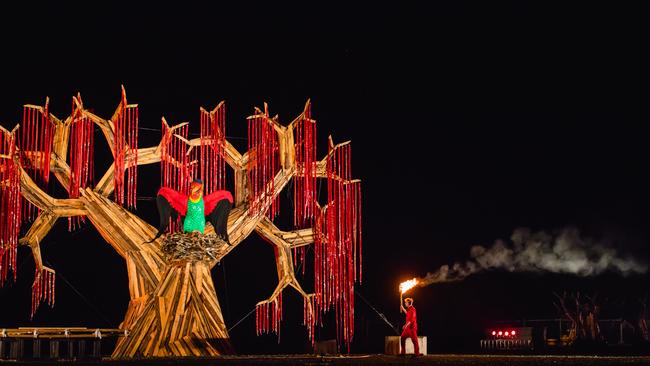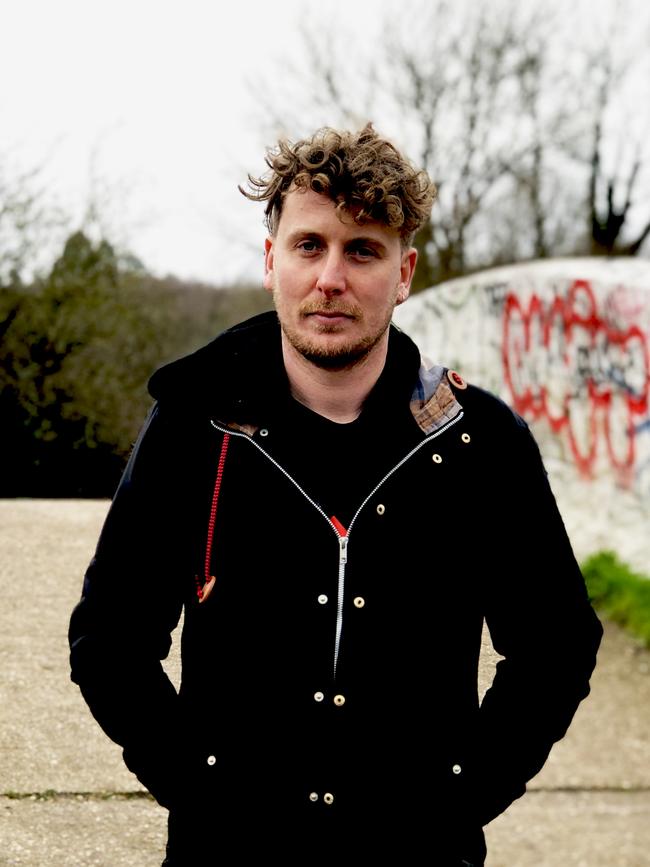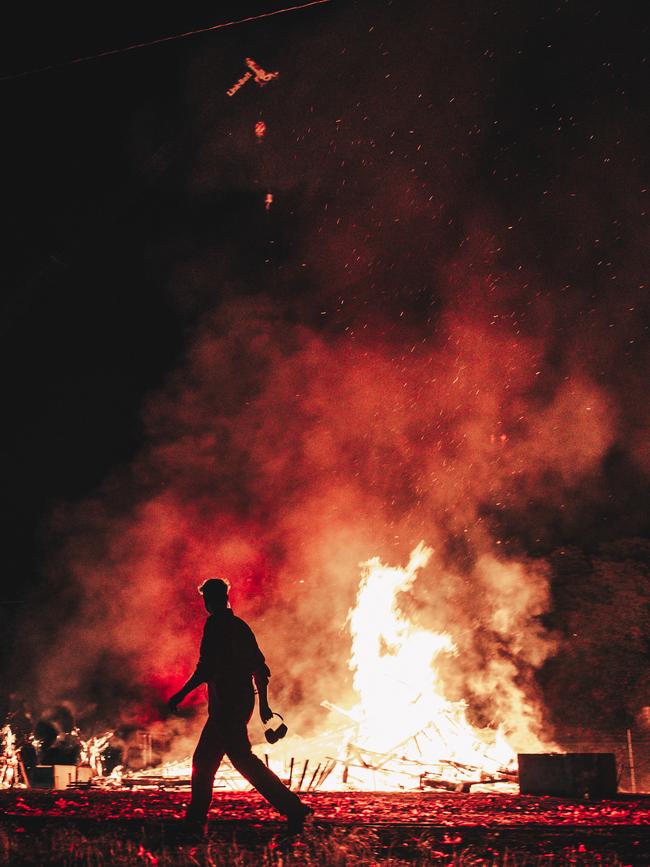Alex Podger’s Memorial: funerals can be explosive at Dark MoFo
Six years ago, Alex Podger stood with a group of fellow mourners and watched as the ashes of his mentor were loaded into a cannon and shot into the night sky. It gave him a bold idea.

Six years ago, Alex Podger stood with a group of fellow mourners and watched as the ashes of his mentor were loaded into a cannon and shot into the night sky.
Encased in a bulbous iron urn, the remains of British-born pyrotechnician Paul Lawler exploded in fiery glory over Woodford, Queensland — a fitting and final tribute to a man who had devoted his life to the art of fireworks.
Podger stood transfixed by that single moment of deliverance, following a tumultuous period of grief for his friend. It was, he felt, the perfect exit route for those seeking closure.
And so came the genesis for Podger’s latest artwork, Memorial, a bold pyrotechnics display that will take centre stage this week at Dark Mofo, Hobart’s annual midwinter cultural festival. The work will see the ashes of hundreds of people exploded in the Tasmanian skies.
“It’s about finally cracking this fleeting moment of relief, after the long, tumultuous build up that is life,” Podger says.
The concept this year garnered the attention of hundreds of families across Australia, willing to have the ashes of their loved ones taped to fireworks and shot into the air, and the London-based pyrotechnician was pleased to accommodate. Podger put out the call at the beginning of May, and within a week had filled his entire program with families who will stand at the foreshore of the River Derwent to see the remains of their loved ones sent into the ether.
Memorial, Podger says, aims to create a powerful tribute to the beauty and intricacies of life — one that exists for only seconds, painting a “glorious inferno” in the sky before fading back into night. It is, he says, a complete rejection of permanent death rituals.
“Western culture is terrified of death, uncomfortable at the sight of dead branches and leaves decaying on our lawns — critical parts of an ecosystem that we habitually remove because they remind us of our mortality,” Podger says.
“I spent a lot of time during the Covid lockdowns walking through this incredible cemetery in East London. The grounds were caked in these tombstones and crypts that were being tipped over by the trees. This idea of creating monuments that are permanent when we die doesn’t really fit in with the reality of what it is to be actually human. A human wants to leave an endless legacy, which left me wondering: What if you create a fleeting memorial to appreciate the complicatedness of life, rather than leaving something permanent?”

As only 100g of the ashes are taped to the fireworks, as opposed to the three kilograms scattered in a traditional cremation ceremony, Podger did not experience any ethical pushback, nor did he require any specific government permission.
Podger liaised with cultural consultant Palawa visual artist Caleb Nichols-Mansell to sidestep any potential ethical risks.
Says Podger: “We talked to a lot of people in situations where they wanted to disperse (ashes) in a big, ritualistic way and we were keen to oblige.”
This year’s Dark Mofo festival reportedly narrowly avoided last minute cancellation after Spanish artist Santiago Sierra’s work Union Flag — which proposed dousing Britain’s national flag in a bucket of blood drawn from Indigenous Australians, and other First Nations people from British colonies — received ferocious backlash.
The piece was intended to be a critique of colonial violence but instead caused great offence, especially among Indigenous groups.
Festival founder David Walsh and creative director Leigh Carmichael were forced to ban the show, and Nichols-Mansell was hired to “repair damaged relationships with the broader community, look towards the future, and find how best we can work together to showcase the deeply connected arts and cultural industry within this state”.
Podger attended his first fire ceremony aged just two. Thrown into what he described as “the family business”, he dawdled behind his pyrotechnician mother, Lily, to witness large-scale outdoor fire performances by Lily’s friends, some of Australia’s “greatest pyros”.
Then he became fascinated with it for himself.

“I was a little tyke barely walking and hanging around these amazing artists,” he says. “Mum now works with me, and she’ll be in Hobart doing the festival while I’m trapped in London.”
Podger grew up in Hervey Bay, Queensland, and left to follow his creative passions at Griffith University’s film school in Brisbane, before moving to Melbourne and London.
As well as Dark Mofo, Podger has created work with renowned Irish theatre company Macnas, Opera Australia, Opera Queensland, Realive Entertainment in China and the 2018 Commonwealth Games Festival in Australia.
He is also the artistic director of Woodford Folk Festival’s Closing Ceremony, the largest annual outdoor theatre project in Australia, which he worked on with Lawler.
The firework shells used in this year’s Dark Mofo performance are the largest permitted by Australian law.
The handcrafted exploding missiles are made up of a spherical cardboard case that is carefully packed with hundreds of tiny balls wound tightly around a grain of rice and comprise a pyrotechnic compound.
The explosives, holding the ashes, will be shot across a thick band of fire, through smoke, across the Derwent, into the air where they will end in a blazing detonation in the sky.
The complexity of the process mimics the complexity of life, Podger says, and allows the families watching on from the waterfront to experience what he says will be “overwhelming catharsis”.
“With all these fire projects it’s about this moment of transformation and release from all the things we’ve processed through the year,” he says.
“We often don’t know what to do when we go through this funeral process, intended to provide a sense of relief, but there’s still this tension there for us because we need to then take this final step of kind of letting go.
“Dispersing the ashes of someone with the fireworks is about honouring those in different steps of grief.”
This year’s Dark Mofo festival will centre around a religious — or sacrilegious, depending on your view — theme, Carmichael says.
“As the coronavirus continues to wreak havoc on the world, we are reminded daily of our vulnerability and helplessness in the face of it all,” he says.
“St Augustine wrote that Christ went to the cross as a bridegroom to the bride, consummated the marriage, lovingly gave himself up to the torment, and joined himself to her forever.
“That is to say, he participated in the suffering and sorrows of the world, joyfully.
“It is within this context that we present our 2021 festival, and pray it brings a glimmer of light in these uncertain times. We invite you to come to the cross.”
Podger’s recurring Dark Mofo street-procession show — Ogoh Ogoh: The Burning — is centred on a “demon effigy” derived from a Balinese Hindu community purification ritual crafted by Indonesian artists.
The “beast” longs to be “fed with human fears” that vanish once set alight.
In 2019, the Ogoh Ogoh took the shape of a Willow tree, a two-year project which saw 200,000 firecrackers fused together.
Thence We Came Forth to Rebehold the Stars is Podger’s second show in this year’s festival.
Podger has combined an experimental percussion score, by London drummer Gareth Brown, with fiery missiles to create a pyrotechnic symphony inspired by Dante’s Inferno.
It will be performed on June 21 on the Hobart waterfront.
A tribute to the winter solstice, the shortest day of the year, the extra darkness adds to the spiritual significance of the performance, he says.
Podger has real faith in the power of Dark Mofo, arguably the country’s most avant-garde mainstream arts festival.
“What blew me away in my first Dark Mofo is how the people there are up for just about anything,” he says. “People are just willing to be led down the garden path.”
Dark Mofo runs from June 16-22 in Hobart, Tasmania.

